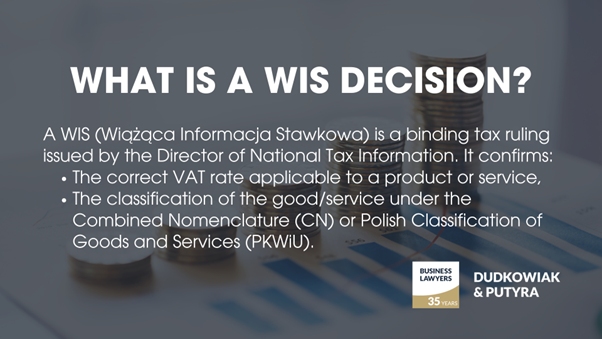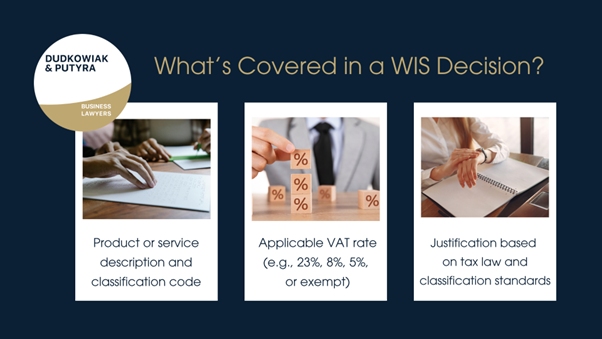- within Tax, Employment and HR and Corporate/Commercial Law topic(s)
- with readers working within the Accounting & Consultancy industries
In Poland, applying the correct VAT rate isn't always straightforward - especially when it comes to services, complex products, or goods with ambiguous classifications. For businesses operating in VAT-sensitive sectors, a mistake in rate application can lead to serious consequences: tax arrears, penalties, and disputes during audits.
That's why Polish taxpayers increasingly rely on Binding VAT Rate Information (WIS) - an official decision that confirms which VAT rate applies to a particular good or service.
What Is a WIS Decision?
A WIS (Wiążąca Informacja Stawkowa) is a binding tax ruling issued by the Director of National Tax Information. It confirms:
- The correct VAT rate applicable to a product or service,
- The classification of the good/service under the Combined Nomenclature (CN) or Polish Classification of Goods and Services (PKWiU).

It functions much like an individual tax ruling but applies specifically to VAT classification. Once issued, it provides legal protection to the applicant and, in some cases, to other taxpayers dealing with identical goods or services.
Why Businesses Use WIS - Binding Rate Interpretation?
In practice, a WIS offers three key advantages:
- Legal certainty – You can apply the confirmed VAT rate with confidence.
- Protection during audits – If the tax authority later challenges the rate, no penalties or interest apply if you followed the WIS.
- Consistency across entities – When multiple taxpayers deal with the same product, a WIS issued to one party may help defend a similar position.
This makes it especially useful for industries dealing in food, healthcare products, digital services, construction materials, and other categories with multiple VAT rates.
How to Apply for WIS Rate Interpretation in 2025
As of 1 January 2024, WIS applications must be submitted electronically via the official system. There is no application fee. However, if the tax office needs to conduct technical studies or analysis (e.g., on product composition), they may request additional documentation or fees.
Once submitted, the authority has three months to issue the decision, though the deadline may be extended in complex cases.
Who Should Consider Tax Rate Interperation?
A WIS is particularly beneficial for:
- Importers classifying new or custom products,
- E-commerce businesses dealing with mixed product categories,
- Service providers applying reduced or exempt VAT rates,
- Companies preparing for a tax audit or expanding to new offerings.
Even in simple cases, a WIS removes ambiguity and creates a documented VAT position aligned with tax authority guidance.
What's Covered in a WIS Decision?
A standard WIS decision includes:
- Product or service description and classification code,
- Applicable VAT rate (e.g., 23%, 8%, 5%, or exempt),
- Justification based on tax law and classification standards.
Once issued, it is valid indefinitely unless the legal framework changes or the facts presented in the application differ from actual practice.

Don't Let VAT Guesswork Create Risk
VAT misclassification can be costly. A WIS decision gives your business the tools to apply the correct rate with full legal backing - and protects you from disputes before they arise.
Want to confirm the correct VAT rate for your goods or services? Contact our VAT advisors or visit dudkowiak.com to explore how a WIS ruling can safeguard your compliance.
The content of this article is intended to provide a general guide to the subject matter. Specialist advice should be sought about your specific circumstances.



